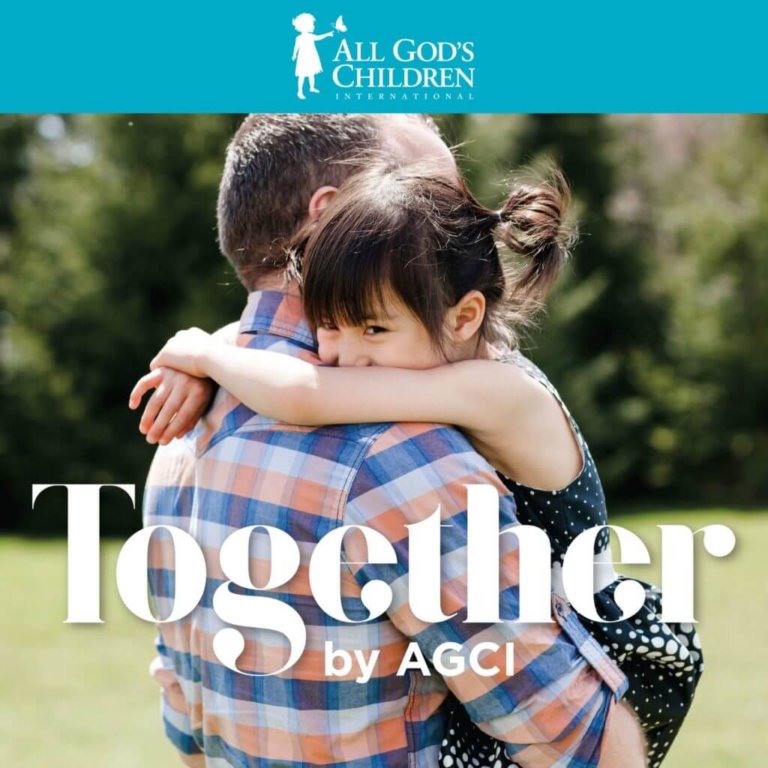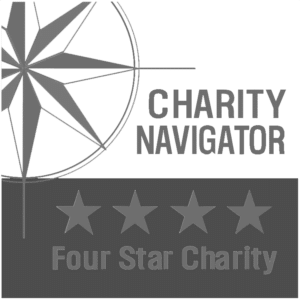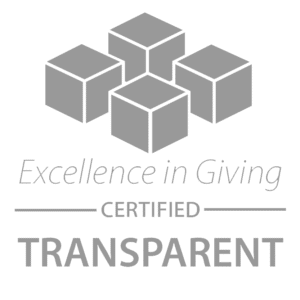Giving Guide VO
You’re listening to Together by AGCI. I’m Dayn Arnold.
Our first location is Colombia with a story of PEACE
[Audio in Spanish]
That is the voice of Alba, a caregiver at an institution in Bogota. She is sharing about a boy named Christian who came into the institution at age six. Here is what she said about him:
Christian is one of the children who screamed for attention. He didn’t follow the rules, or instructions, or anything. He is a very difficult child.
I’m going to try something I’ve never tried before on the podcast, using an interview in a language other than English. I do it all the time in video, but I can’t subtitle her voice, so I’m going to ask my coworker Tati to help because it just sounds weird for a guy to speak on Alba’s behalf. Here we go.
I began to approach him in an affectionate manner.
I also began to work with him by asking him to use his words, because we were both going to use our words.
We would use words. Sometimes he would say, “Albita, I want you to read me a story today.” Or, “Albita, I want to listen to the music that you play for me that is soft and calming.” So then I would tell him, “That is using your words. You are telling me what you like, and we can reach an agreement because I can understand you.”
When he began to use his words, many nights we would stop reading our books and we would talk. He would begin telling me about his family, about his life.
One day he told me, “My dad is not my dad. He is another man who would beat me. He would touch my sisters in a way that he should not have touched them.” I mean, he would tell me all of his experiences. He told me, “Albita, is it important that I don’t take things from the other children?”
“Yes, it is very important.”
“Now I understand why.”
So I asked him, “Why?”
“Because my mom is in jail because she would steal from people.”
Then I reiterated, “Yes, that is something we should not do, because that is why your mom is there.”
Then I told him, “See how nice it is to use our words? We are understanding one another and I am learning your story.”
One night we were having one of our conversations, and he told me, “Albita, in my life I will never forget you.”
It was so beautiful to hear that he would never forget me.
That’s all that he needs: love.
Thanks Tati.
AGCI’s team provided Alba and others with coaching and support to help them understand how Christian’s history might be driving his behaviors, and offered new ways for Christian to express his needs. Twelve months later, Christian’s negative behaviors subsided, and his playful and caring personality came shining through. By giving a gift, you can help provide family-like, elevated care.
As you can tell, today’s episode is a little different than ones we have done in the past. We wanted to take AGCI’s yearly Giving Guide and adapt it to a podcast format. Rather than just reading stories of transformation and providing you an opportunity to play a part in the work, we’re hearing from the actual people whose stories are being told. Today we will have stories that take place in Colombia, Ethiopia, Bulgaria, Thailand, and here at home, and my hope is that you’ll hear these five stories (including Alba and Christian), and head to our website to learn more about giving toward one of these causes.
Next up, Ethiopia, and a story of HOPE.
First, before we get to the story, I want to acknowledge that Ethiopia has been in the news lately as fighting has broken out between the current Ethiopian government and the Tigray People’s Liberation Front, which was in political power in the country for many years. Our staff continue to care for children and families in Tigray, Addis Ababa, and Gambela, but it is not easy. In fact, as we received the recording I will play in a minute, high-speed internet was becoming more difficult to find, and even getting this incomplete clip was a bit of a minor miracle. This is a tenuous time for Ethiopia as a nation, so we ask for your prayers that there would be peace quickly.
Our story takes place in Lebu, a poor community in the capital city of Addis Ababa. Azeb, who you may recognize from our previous episode, “AGCI’s Frontline Work in Ethiopia,” has been running a pilot program, teaching mothers in the Lebu community about the principles of TBRI. These principles have the potential to strengthen family bonds and keep those families together, preventing more children from leaving home to ultimately live on the street. Azeb tells a quick story of one a boy named Tesfaye Engeda, and his mother Kalkidan, one of the women from the initial TBRI training, and how a shift in perspective has brought the two of them closer together.
Our organization, All God’s Children, supported for over 200 students in Lebu and Jomo city. From this sub-city, Tesfaye Engeda is one. His mother is Kalkidan also. AGCI started a TBRI pilot program for 20 families. Kalkidan is also one of those families. Kalkidan was more focusing to correct her child. She punished him, more focusing on how to correct her son before, and after the TBRI training, she was playing with him. She was telling the story: she was very inspired about the TBRI training, and one story, she told me that her son asked her [why] she kissed him so many times after the TBRI training. And she said, “Because I love you, because I trained this training.” She was telling him about this story.
Let me just clarify and fill in a couple little gaps because of our limited communication with our Ethiopian staff at the moment. Typical discipline in the Lebu community is physical, and outward expressions of affection are rare. The mother in this story, Kalkidan, had been receiving the TBRI training, and began changing her behavior toward her son Tesfaye. One day, Tesfaye told his mother, “Are you okay? I am worried because you have been kissing me so much,” and she replied, “I love you and you are a good boy, and I have been going to trainings that help me.” Tesfaye’s response? “You should keep going every day.” Both Kalkidan and Tesfaye are learning that outward affection builds trust and strengthens the bond between parents and their children, and greatly reduces the risk that Tesfaye will end up on the street. This is one small victory, but it’s the beginning of the amazing things God is beginning to do in Ethiopia.
By giving a gift, you can help a child thrive and stay in their family.
Next up, Bulgaria, and a story of LOVE.
Our next story comes from Nick & Beka Wolfe, who waited five years to be matched with their daughter, and then COVID hit, international travel fell off the map, and they had no idea how long they would have to wait to bring Shiloh home.
We had arranged to have a Zoom call, but on the day of our call, the timing happened to catch them right on the tail end of a two-day roadtrip in the parking lot of a gas station outside Knoxville, Tennessee. I am so grateful they could make the time to talk when they probably would have preferred to just arrive at their destination. Here are Beka, Nick & little bit of Shiloh.
Um, well, we are Nick and Becca Wolf and we live in, uh, the Des Moines, Iowa area. Um, we actually started the adoption process back in… We made the decision in June of 2014. We were struggling with, uh, infertility and just saw this as another option to grow our family. Um, even though we had always intentionally thought adoption would be part of our story, we didn’t know that God had it for our very first instead of in addition to other children. Um, and through All God’s Children, we discovered the program of Bulgaria. But we were very drawn to the country and, um… We were excited to get all of the paperwork started and just kind of, uh, that took about a year to get all the home studies, dossier, everything kind of going there. And, um, and then we were officially on the registry in December of 2015. So we had been waiting from, uh, December of 2015 until October of 2019, when we got a referral of our two and a half year old daughter Shiloh. Five years from first conversation with AGCI to, uh, you know, to the actual referral. So five years.
It was beautiful. It was perfect getting, getting that phone call from Connie. And, um, she had been through a lot with us too. So I think, for her, she was just like, yay. Rejoicing with us.
When you adopt from Bulgaria, you take two trips. The first trip is your chance to spend time with your child and get started with paperwork that will eventually give you legal guardianship. Then you return home as the paperwork continues to be processed, and typically in around six weeks you are able to return, finalize the adoption legally, and bring them home. Bekah and Nick took their first trip to Bulgaria in December of 2019 and were able to spend time with Shiloh for the very first time.
Yeah. She was just a bundle of fun right off the bat. Her and Nick bonded really quickly. Um, yeah. She’s just a goofball and hilarious and got a lot of personality.
You know, she came out in this like beautiful pink dress and had this pink bow tie in her hair on Friday morning. And I’m like, man, I gotta leave this girl. You know what I mean? And it was just, it was, that was tough. It was so hard.
There was literally nothing in our minds between trip one and trip two besides the court decree stuff. So really I kept thinking, Oh, but we’ll see her in the end of February into March. Like we, you know, there’s a settled, this is how long it’s supposed to take. It’ll be great. It’ll be fine. We’ll prepare, we’ll get a room ready, blah, blah, blah. So I was in the very like practical, This’ll be great, type thing. The plan was like March 18th is when we were going to go back. But a week before that everything shut down and, you know, so we weren’t able to actually go until, and see her until July. So it was a different scenario because of COVID. We finalized all of our stuff for the second trip and it was like, when do you want to go? And, and, uh, everybody was kind of, you know, there were whispers of COVID and you know, the possible challenges ahead, but nobody really knew, right? And so initially it was supposed to be like a month thing, right? It was like, Hey, it’s like a month or two, probably just gonna pass.
With each month going by, it was just, the… I think a little bit of our hope got chipped away. And we had told Connie, um, you know, as soon as there is any hope of us going, a window, whatever, we’ll stop everything we want to get over there because we knew as, you know, as this drags on and they’re trying to shuffle different people and different things around, that it could be well into, you know, the fall or the winter.
As Beka and Nick waited, the central authority of Bulgaria was working with the US Embassy to provide guidelines for an exception to the travel ban both from the US and into Bulgaria, and our AGCI staff was arranging all the details of their in-country needs, and monitoring the situation as it developed. Nothing was certain, but a window opened, and they were allowed an exception to the travel bans so long as they completed a full two-week quarantine in Bulgaria before seeing Shiloh.
When we went, we were required to do a two week quarantine before we even went to get Shiloh. So we were actually in country for 25 days instead of the initial 10 days.
It’s been an amazing journey and process for sure. And, um, but it’s totally worth it. So, I mean, it’s, you know, I know that some people might be listening to this that, uh, um, you know, that have been in the process a long time as well. And they’re, and now you’re going through COVID too. Uh, but it’s totally worth it and God is faithful and lean into him and, um, you know. Yeah, wouldn’t change it for the world.
2020 is the year these three will celebrate Christmas together for the first time, and I have no doubt it will be a memorable one.
By giving a gift, you can help children unite with their forever family.
Next up, Colombia, and a story of JOY.
If you’ve been around AGCI at all over the last few years, you’ll know about the Dream Home. The Dream Home is AGCI’s first home specifically designed for girls who have grown up in the system, providing them with opportunities to be independent while pursuing their university degree. The students in the home are exceptional, and the home is beautiful, but one real gift for these young ladies is 24-7 access to caring adults who can help shepherd them in difficult times. Right now we’re going to hear from Ana Maria Fernandez, our Colombia Child Advocacy Director who is the smartest and busiest person I know. She is going to share with us about Dream Home resident, Marcela, who nearly lost everything before she discovered how much she was loved.
Marcela entered the dream home, very seemingly put together, but very kept to herself. She was 19 years old. She was starting third semester on economics. She was very driven. She was working, she had godparents, many of the girls, they do, but she had godparents that came, uh, from ICBF, uh, from long time ago. She was studying English and she was, her life was organized, as she told us at the beginning. But we started to see that she only took care of herself. She wanted the prettier room, the best place in the room. She wasn’t really engaging with the Casa Suenos community. And as the time went on, everything started to fall apart.
She found her survival strategy of pushing others away, handling things mostly on her own wasn’t just really working anymore. The first semester she started at the Dream Home, she was struggling to meet her university responsibilities. And this was a huge stress trigger for her. On the second semester, she had to quit most of her classes to only take one, according to her, because she had an issue with a teacher. But we were starting to see that there was something else behind.Our team met wit
h her government case worker to strategize with Marcela and to help her structure her life and her responsibilities. But the structural solutions were not enough. She needed emotional healing, but she was so resistant to accept it.
We kept seeing behaviors of doing too much. She needed to be occupied the whole time. At the beginning, as I already said, it was English classes, working the whole day in a multinational as an administrative assistant, then going to school to the university. Afterwards she focused more on sports, going to the gym, but really overdoing. And later on, we kept seeing these behaviors reflected in other things.
Because of the trauma she experienced in broken relationships, growing up in institutions, eh, we have to remember that she had been in ICBF for 12 years when she arrived to the Dream Home already. She couldn’t really trust anyone to help her. She was afraid to open up and get deeply hurt all over again. So out of desperation, she was frantically rejecting everyone who was trying to care for her in an intimate way. And she was trying to find solutions on her own or even to keep her mind so occupied that she didn’t really have to think about any of her emotional problems.
As she kept rejecting help, she was constantly stressed out, very moody and grumpy. She was resisting our team on everything. She was pushing away her godparents that, uh, had a long relationship with her, and they still have. And she had a really contentious relationship with one of her roommates. But our team didn’t give up on her because she pushed us away so many times, and yet we were always there for her. She finally was able to accept that we were people that she could trust.
A huge transformation began when she finally started opening up to our psychologist in the home and working on the internal things she had been struggling with for a long time, but she was too afraid to let anyone help her with. One afternoon, she was at the home and we had several situations in the previous months. Uh, the last one, uh, obsessive or excessive behavior was that she was getting involved with one, uh, traders fund or something, telling us that that was the solution to her life, that she was going to become rich. And that, eh, she was working there and she basically focused on that. She was almost going to drop university because of that.
And, uh, as I was saying, uh, one afternoon, it was a rainy afternoon, I remember, the psychologist called me and said, Uh, we really need to sit down and talk to Marcela in a different environment. So they came to my home with Christina, the psychologist, and we basically sat down. She didn’t even want to look at us. And it was an amazing transformation. We didn’t see any results that afternoon, but we could feel that after a couple of hours, something changed. Something happened there.
And now she’s a completely different girl. She’s lighthearted and funny and warm, and when you talk to her, you can just sense that she’s feeling so much more peace and security. The roommate she was always fighting with is now her closest friend in the home. And she’s able to have a real relationship with her housemates. Her godparents, whom she allegedly told us she was really fighting with them, she’s now able to go to their home again and talk to them and trust them. Right now she has a close, trusting relationship with our staff team and she can receive love and support from us. The deep healing process Marcela is going through is the foundation for her to know how to operate in a healthy, trusting relationships for the rest of her life, and how to be the confident, secure person God created her to be.
That was Ana Maria Fernandez sharing about Marcela who is back on track toward a career in economics. By giving a gift, you can help an aging orphan prepare for an independent future.
Our last location today is Thailand, and a story of LIGHT.
Part of AGCI’s ambitious plans for the future include establishing Child Advocacy Centers in strategic locations, from which we can empower local leaders to create paths to families and independence. We have established ourselves in Colombia, which can serve as a hub for all of Latin America, we are increasing our work in Ethiopia, which can serve as a hub for all of Africa, and we have been looking for a location in Asia that can serve as a hub for the continent. We have a friend who knew what we were praying for and reached out to a former colleague in Thailand.
You may recall Amanda Purvis of the Karen Purvis Institute of Child Development. In a two-part episode of Together by AGCI called “Let’s Talk About Race and Adoption,” she talked with me about her experience as a mother of black children, and ways adoptive parents can incorporate the principles of TBRI into their conversations with their black and brown children. (I’ll link to the episode in the show notes.) Amanda and her colleagues are the best resource for where and how TBRI is being used across the globe, and so when AGCI was interested in working to establish a Child Advocacy Center in Asia, she told us about someone who used to work directly with the Karen Purvis Institute who was now working for an NGO in Thailand called Step Ahead. We were put in contact with the leadership at Step Ahead, learned about their implementation of TBRI in Thailand, and we asked if there was anything we could do to support them. Step Ahead needed some support to provide a training for Thai nationals, and we were in a position to provide that. We continued to have a dialog with the folks at Step Ahead, and started learning more about how TBRI could change everything for family services in Thailand.
As a quick sidenote, my wife and I lived and worked alongside two mission organizations in Thailand from 2012 to 2016. Two of our three kids were born there (no, they don’t get citizenship), and many of our dearest friends came out of that season. I deeply miss living and working overseas, driving on the other side of the road, and standing head and shoulders above everybody around me. Honestly, I wish I was in Thailand right now as the seasons go from sweltering humidity to warm perfection. Thailand will always have a special place in my heart.
Step Ahead has a Thai social worker on their staff whose CV, connections, and expertise put her in a unique position to influence the full spectrum of child and family services in Thailand. I was privileged to hop on a Zoom call with her this last week. I told her I would only take 15 minutes of her time, and she ended up telling me stories for an hour. She is passionate, driven, and delightful. I hope you enjoy a few minutes with her as much as I did. Here’s Puu Saa.
My name is Puu Saa Sivilad, and, uh, I am a social worker. I grew up in the family where my parents have 12 children. So I am always surrounded by the sister and brother, but my father is, um, policeman. And, um, my mom had to take care of many children. So we were very poor back then.
I think my mom is my model for the being the social worker, because she always do something for someone else.
Puu Saa told me she did well in school, and despite coming from a poor family, was able to attend the best school in her province. Most of her classmates planned to become doctors, nurses, and engineers, but she wanted a profession that could help others.
That psychology. So that’s, uh, clinical psychology is my background. I choose to continue my master degree as social work.
Puu Saa told me a story that pushed her to fight for the rights of children, especially in cases of human trafficking. She was living and working in a small province. Her department became aware of a Foreigner living in Thailand who had paid a hill-tribe Woman for her illegitimate son. The man claimed the boy was his son, but all the while, he was abusing the boy. Puu Saa even had to disguise herself and look for evidence of the boy’s abuse, which led to taking the man to court. At the time, there weren’t really any child-protection laws in place in Thailand, and with counterfeit paperwork, the man was able to get away with claiming to be the father, and the case was lost.
This experience, and many others, lit a fire in her, and she has committed her last twenty-plus years to changing policy to protect children and families.
At that time, our child abuse law is not so good because it’s back before the Child Protection Act would, would happen. Since this case happened, so I think, I cannot live in a small province anymore because being a social worker in a small province, I cannot change anything. So, so I decide to change my location from the border province to live in, uh, to come back into the Capitol to Bangkok.
Puu Saa wanted change so badly, she moved to Bangkok to be closer to the policy makers who could change the child protection laws.
Her next job was working with women and children who were being trafficked, getting children out of detention centers and working with the governments of Thailand’s neighbors, Myanmar, Laos, Vietnam, Cambodia, and China. That work began to give her a legal framework and vocabulary that would allow her to be involved in policy decisions in the future.
Always about a life of a child that was abused, and then I need to fix something. I need to do something, and beyond my best capacity to contribute to that. I kind of direct me to improve more better child protection system in Thailand as well.
After working in social work for nearly 20 years for everyone from the Thai government to Unicef, Puu Saa could see that there were many organizations working for the rights of children and families, but they were not collaborating and sharing resources.
Puu Saa was influential in the creation of a Collaborative of 48 NGO’s in Thailand, providing An opportunity to share resources and collaborate. One of those organizations was Step Ahead, led by Executive Director Kimberly Quinley.
I know Step Ahead through that, because at that time Kimberly would like to advocate for changing in the legislation on child protection to take care of more on that many aspects of the, of the alternative care. Which is the, uh, later turned to be my focus, because I’m shift away from the safety or, or the protection issue to be more taking care of the wellbeing of the children.
Just to reinforce what Puu Saa just said, her focus shifted from protection after rescue from abusive situations, to what she calls “alternative care” which focuses more on strengthening families so they can stay together.
As her perspective began to change, she left her prominent positions in large, well-known organizations to join Step Ahead.
Step Ahead, it’s like Kimberly and Step Ahead is so generous to support me because, uh, Kimberly know that I have the, a good connection with the government because I’m the former, uh, government, uh, official. And then I also have the good connection with the cross-border as well. I mean, with the neighboring countries, and then it should be able to, kind of in a better position to advocate on this issue.
Puu Saa was able to attend a training in the UK, and part of the training was an introduction to the principles of Trust Based Relational Intervention, or TBRI.
And I came, I came back to Thailand. I think I could share this knowledge and the new learning to start to tell all my sister and brother in the ministry that, Hey, we can change the way of we’re taking care of the children. And we don’t need to focus only the protection part, which is more like a… If you consider as the group of children and as the pyramid, and then the group that I work as the victims, or the child abuse case, is just at the top of the pyramid. And it could be a kind of 10% of the whole 100%. Maybe there is a way that I could prevent the top part to happen.
AGCI’s generous donors are able to support the work of Puu Saa and the others at Step Ahead, who are finding opportunities to train social workers, government anti-trafficking Ministries, and international NGO’s using the principles of TBRI. And because of her extensive connections in government and higher education, Puu Saa hopes to bring TBRI to university social work education. She also told me she wants to start talking with the ministry of education about how to incorporate TBRI principles into schools, and she is sharing what she is learning with her friends in neighboring countries too. She and Step Ahead have no shortage of ambitious plans, and they have the connections to see them through, and AGCI is privileged to be able to be a part of transformational work in Thailand, and the rest of Asia.
There’s some support. We could do that because we have to donate our time to contribute our time to do something else. So that’s, AGCI make this possible also that I will have more time to concentrate, and develop, and then provide some guidance to my social work friends more.
To learn from AGCI, and then to be supported by AGCI as well as the Step Ahead, I think I’m lucky to meet, to meet you all.
I hope you feel encouraged by the work of Puu Saa. By giving a gift, you can help change the system that keeps children in institutions and out of families.
Thanks sticking with us for our audio giving guide. It was a pleasure getting to hear these stories myself. Don’t forget that these stories are all tied to our actual giving guide, and if you’ve been inspired by any of these stories, consider heading over to allgodschildren.org/merry (as in merry and bright) to get started. Your gifts are tax deductible and have the opportunity to bring hope, joy, light, peace, and love to folks in need.
If you liked what you heard on today’s podcast, consider rating and reviewing us, or tell a friend. If you have any suggestions for future episodes, or you want to just let us know how we’re doing, we’d love to hear from you. You can email us at together@allgodschildren.org.
It’s a privilege to be a part of your life. Don’t forget, we’re all in this – together. We’ll talk to you soon.










